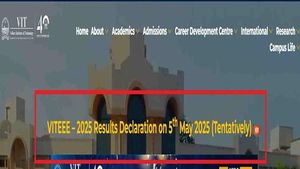The movement for California's independence, known as 'Calexit', is gaining considerable traction as the state aims to allow its residents to vote on whether to secede from the United States. The state's Secretary of State, Shirley Weber, has officially approved the initiative, empowering advocates to begin gathering signatures necessary to place this historic question on the ballot.
With the goal set, supporters need to collect significant backing—at least 500,000 signatures—by July 22, 2025. Should they succeed, the question posed to voters will be simple yet monumental: "Should California exit the United States to become its own independent nation?" This proposed measure echoes the sentiment felt during the UK's Brexit vote, highlighting the rising concerns among Californians about the effectiveness and responsiveness of the federal government.
The push for independence is largely fueled by growing discontent among Californians, many of whom feel increasingly disconnected from Washington. Proponents argue it’s time California, with its thriving economy and diverse population, assert its place as a sovereign entity. Marcus Evans, the political activist behind Calexit, emphasizes the uniqueness of California's situation. "We believe it’s the right moment for Calexit. We are in a much stronger position now than we were back when this idea was first proposed during Trump's presidency," Evans stated.
For Calexit to materialize, not only must the necessary signatures be gathered, but the initiative must also capture the support of at least 55% of voters participating in the election for independence. Achieving this will require widespread engagement and mobilization within the state. If successful, the initiative will signify more than just California's departure from the union; it will express widespread discontent and desire for autonomy.
The financial aspect of launching Calexit cannot be overlooked either. Reports indicate the endeavour could cost up to $10 million, with significant funds dedicated to the operational costs of the oversight commission, which will be established to assess California's viability as an independent state. This follows through on commitments to study the feasibility of becoming self-sustained and independent from federal governance.
Advocates of independence often cite California's economic prowess—reportedly the fifth-largest economy globally, larger than many established countries—as sufficient justification for its nationhood. The prospect of California standing alone, yet thriving, intrigues voters and fuels the debate on the matter. The campaign promises to explore the logistics of such separation including economic strategies and governance frameworks necessary for autonomy.
The approval of Calexit has sparked conversations not just within California but across the nation, drawing attention from political analysts and citizens alike. It raises questions about state sovereignty and the power dynamics between individual states and federal authority. Media coverage from outlets such as the New York Post and CBS News highlights both the enthusiasm and skepticism surrounding the movement, showcasing the diverse opinions among the public.
Support for Calexit has gained momentum since its initial conception, but some remain wary of what the actual implementation of such independence may entail. Questions concerning international relations, trade, defense, and public services loom large over the discussion. Critics argue the act of secession could destabilize political and economic relationships not only with the federal government but with neighboring states and beyond.
Nonetheless, as the clock ticks toward the signature deadline, advocates are mobilizing, urging fellow Californians to join their cause. The political atmosphere is charged, and with the current trends of regionalism and populism evident across the globe, the Calexit initiative reflects broader sentiments of autonomy and self-determination.
Evans remains hopeful, stating, "This is not merely about secession; it’s about taking charge of our destiny, addressing the needs of our people, and establishing California as a leader on the global stage." The upcoming years will prove pivotal as momentum around this significant political movement builds. Investors, policymakers, and citizens will watch closely to see if California can gather the necessary support for what many see as not just the call for independence, but as the embodiment of the state's herculean spirit.
Looking forward to the possible realities of Calexit, the state of California finds itself at the center of discussions about sovereignty, identity, and the future of democracy within the United States.



